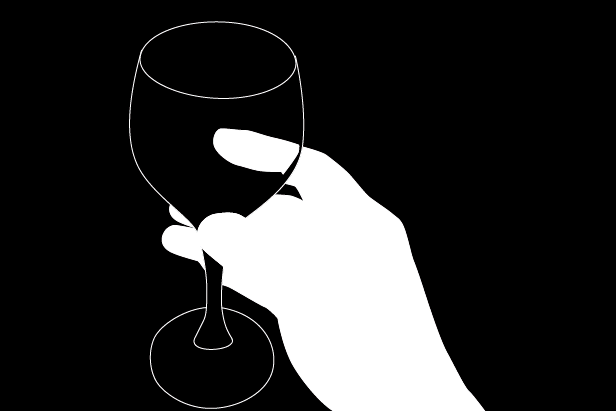5/5 say yes.
Cheers to your health! All five of our experts give red wine a purple-stained smile.
At 125 calories for a five-ounce pour, it’s a lighter choice than beer and mixed drinks, says Julia Zumpano, a dietitian at Cleveland Clinic’s Heart & Vascular Institute. And yes, it’s got more antioxidants, too—including resveratrol, that famous compound billed as the miracle in chocolate and vino.
But recent research has given resveratrol the side eye as the reason for wine’s healthy glow. The aptly-named inCHIANTI study, a 16-year-long look at the blood, urine and dietary questionnaires of hundreds of people living in the Italian wine-making region of Chianti, recently found that resveratrol wasn’t associated with disease or lifespan, to the shock and dismay of wine lovers everywhere. But that doesn’t mean red wine does nothing for you—just that resveratrol might not be compound that deserves all the credit. “Many studies have shown that moderate alcohol consumption, especially wine, is associated with lower cardiovascular disease and mortality compared with both no alcohol consumption or consumption above moderate,” says Luigi Ferrucci, founder of the inCHIANTI study and now scientific director of the National Institute on Aging. “The mechanism of this association is not clear, and does not appear to be related to resveratrol.”
And even if it does have a positive effect, some experts say there’s likely not enough in a glass to make a difference. “Despite the common belief, resveratrol content in wine is very low, highly variable and thus unpredictable,” says Juan Carlos Espín, a research professor in the department of food science and technology at the Spanish National Research Council who studies the compound. Red wine’s wide spectrum of polyphenols is the more important part, and you’ll probably have to commit to the habit (moderately!) to get lasting health benefits, he says.
What we do know, says David Katz, MD, director of the Yale University Prevention Research Center, is that drinking habitually but moderately prevails in the Mediterranean diet. “So whatever the mechanisms, moderate alcohol intake—perhaps red wine especially—is associated with health and long life,” Katz says.
Light drinking in general—up to a drink a day for women, and two for men—is known to be good for you, says James O’Keefe, MD, chief of preventive cardiology at Mid America Heart Institute in Kansas City. It’s associated with lower risk for coronary artery disease, diabetes, congestive heart failure and stroke. And all of our experts agreed that red wine takes the ribbon. “Red wine is clearly the drink of choice if you are doing light to moderate drinking for your health, and daily consumption just before or with the evening meal may be the most protective pattern,” O’Keefe says.
In fact, O’Keefe says his grandma Dorothy used to enjoy a happy hour drink every night, and she lived to be 103. “She used to joke, ‘The key to a long healthy life is to not drink too much…but then again, don’t drink too little either.’”

Read next: Should I Eat Pizza?
More Must-Reads from TIME
- Why Trump’s Message Worked on Latino Men
- What Trump’s Win Could Mean for Housing
- The 100 Must-Read Books of 2024
- Sleep Doctors Share the 1 Tip That’s Changed Their Lives
- Column: Let’s Bring Back Romance
- What It’s Like to Have Long COVID As a Kid
- FX’s Say Nothing Is the Must-Watch Political Thriller of 2024
- Merle Bombardieri Is Helping People Make the Baby Decision
Write to Mandy Oaklander at mandy.oaklander@time.com